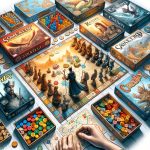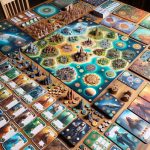Are you looking for a fun and engaging way to improve your decision making and financial literacy skills? Look no further than economic strategy board games. These games are designed to simulate real-life economic and strategic decision-making, making them both entertaining and educational. In this article, we will explore the world of economic strategy board games, their benefits, top game recommendations, and how they can improve decision-making skills.
Economic strategy board games have gained popularity in recent years as more people seek out intellectually stimulating forms of entertainment. These games offer players the opportunity to make strategic decisions in a simulated economic environment, providing a unique learning experience that can be applied to real-life scenarios. Whether you are a seasoned gamer or new to the world of board games, there is a wide variety of economic strategy board games available for different skill levels and interests.
Playing economic strategy board games offers numerous benefits beyond just entertainment. These games can help players develop critical thinking, decision-making, and financial literacy skills while also providing an enjoyable social activity. In the following sections, we will delve into the benefits of playing economic strategy board games, explore the psychology behind these games, and provide strategies for winning at these intellectually stimulating games.
Whether you are looking to enhance your cognitive abilities or simply have a good time with friends and family, economic strategy board games offer something for everyone. So let’s dive into the exciting world of economic strategy board games and discover all that they have to offer.
Benefits of Playing Economic Strategy Board Games
Economic strategy board games are a popular choice for those who enjoy challenging themselves and testing their decision-making skills. These games are not only entertaining but also offer a wide range of benefits that can improve cognitive abilities, social skills, and financial literacy.
Some of the key benefits of playing economic strategy board games include:
1. Critical Thinking: Economic strategy board games require players to analyze different scenarios, weigh their options, and make strategic decisions to achieve their goals. This process helps in enhancing critical thinking skills and the ability to solve complex problems.
2. Social Skills: Many economic strategy board games involve interaction with other players, fostering teamwork, negotiation, and communication skills. Players learn how to collaborate effectively, build alliances, and compete in a respectful manner.
3. Financial Literacy: These games often simulate real-world economic systems and financial transactions, providing players with valuable insights into money management, investment strategies, and risk assessment. As a result, players can develop a better understanding of financial concepts in an engaging and practical way.
Overall, playing economic strategy board games offers individuals the opportunity to challenge themselves intellectually while also enjoying a fun and immersive gaming experience.
Whether you’re a seasoned gamer or new to the world of economic strategy board games, there are numerous titles available that cater to different interests and skill levels. Some of the top economic strategy board games to consider include:
Each of these games presents unique challenges and gameplay mechanics that provide hours of entertainment while honing valuable skills such as resource management, long-term planning, and adaptability.
Given the wide array of benefits associated with playing economic strategy board games, it’s no wonder that these games have become increasingly popular among people of all ages. Whether you’re looking to sharpen your decision-making abilities or simply have some fun with friends or family, economic strategy board games offer an enriching gaming experience that can leave a lasting impact on players’ cognitive development and social interactions.
Top 5 Economic Strategy Board Games to Play
Settlers of Catan
One of the most popular economic strategy board games is Settlers of Catan. This game involves players competing to establish settlements on the fictional island of Catan. The game requires players to trade resources, build roads, and strategically place settlements in order to accumulate victory points. Settlers of Catan is known for its immersive gameplay and has been a favorite among board game enthusiasts for many years.
Puerto Rico
Puerto Rico is another top economic strategy board game that offers players a chance to engage in a virtual economic simulation set during the age of Caribbean ascendancy. Players take on the roles of colonial governors on the island of Puerto Rico, managing resources such as corn, indigo, sugar, tobacco, coffee, and ultimately shipping them off for profit. Puerto Rico is highly regarded for its complex decision-making mechanics and strategic depth.
Power Grid
Power Grid is an economic strategy board game that puts players in the role of competing power companies trying to supply the most cities with power. Players must bid against each other for power plants, acquire resources needed to power those plants, and compete for effective control over regions in order to earn money. Power Grid is praised for its challenging gameplay and intricate resource management mechanics.
Engaging in these top 5 economic strategy board games can provide hours of intellectual stimulation while honing financial decision-making skills. As players immerse themselves in virtual economies, they learn valuable lessons about resource management, strategy development, negotiation tactics and how to carefully invest their resources. Whether played competitively or cooperatively, these board games offer a fun way to enhance one’s understanding of economics and strategic thinking.
How Economic Strategy Board Games Can Improve Decision Making Skills
Economic strategy board games are not just a fun pastime, but they can also be an excellent tool for improving decision-making skills. Whether it’s managing resources, making investments, or outmaneuvering opponents, these games offer players the opportunity to practice critical thinking and strategic planning in a risk-free environment.
One of the key ways that economic strategy board games improve decision-making skills is by requiring players to weigh their options and anticipate future outcomes. For example, in games like Settlers of Catan or Monopoly, players must make choices about where to invest their resources and how to allocate them effectively. This encourages players to consider the potential consequences of their decisions and develop long-term strategies.
Moreover, economic strategy board games also help players develop their ability to assess risk versus reward. Making bold moves can lead to great rewards, but it also comes with substantial risks. By playing these games, individuals can learn when it’s appropriate to take calculated risks and when it’s best to play it safe. These skills can be directly applied to real-life scenarios such as investing in the stock market or making career decisions.
Finally, economic strategy board games often require players to adapt and adjust their plans based on changing circumstances. This flexibility is crucial in decision-making processes as individuals are often faced with unexpected challenges or opportunities in both personal and professional settings.
| Benefit | Explanation |
|---|---|
| Critical Thinking | Players practice weighing options and anticipating future outcomes |
| Risk Assessment | Players learn how to evaluate risks vs rewards and make calculated decisions |
| Adaptability | Games encourage flexibility and adjusting plans based on changing circumstances |
The Psychology Behind Economic Strategy Board Games
Economic strategy board games are not just about rolling the dice or moving game pieces on a board. There is a psychological aspect to these games that makes them not only enjoyable but also mentally stimulating. The psychology behind economic strategy board games involves understanding human behavior, decision-making processes, and the impact of various choices on outcomes.
One key aspect of the psychology behind economic strategy board games is the concept of risk-taking. Players are often faced with decisions that involve taking calculated risks, which can mirror real-life scenarios in business or investing. Understanding how players approach risk and uncertainty in these games can provide insights into their individual risk tolerance and decision-making style.
In addition, economic strategy board games also require players to anticipate and strategize their moves based on their understanding of human nature. This can include predicting opponents’ actions, negotiating deals, or even bluffing to gain an advantage. These elements reflect the dynamics of social interaction and can offer valuable lessons in interpersonal skills and conflict resolution.
Overall, the psychology behind economic strategy board games points to the complexity of human decision-making and behavior. By delving into these psychological aspects, players can gain a deeper appreciation for the underlying dynamics of these games and how they can be applied to real-world situations.
- Some popular economic strategy board games include:
- Settlers of Catan
- Power Grid
- Puerto Rico
- Terraforming Mars
- Agricola
- These games require a mix of strategic planning, resource management, and negotiation skills to succeed.
- The psychology behind these games involves understanding player motivations, risk assessment, and strategic thinking.
- Players can develop critical thinking skills, learn how to adapt to changing circumstances, and understand the impact of various decisions on outcomes through playing economic strategy board games.
Strategies for Winning at Economic Strategy Board Games
When it comes to winning economic strategy board games, there are several key strategies that can help players come out on top. One important tactic is to focus on long-term goals rather than short-term gains.
This involves making decisions that may not provide immediate benefits but will set the player up for success in the later stages of the game. Additionally, understanding the value of diversification and risk management is crucial in economic strategy board games, as it can help players navigate uncertain economic conditions within the game.
Another effective strategy for winning at economic strategy board games is to pay close attention to opponents’ moves and adapt accordingly. By understanding the different play styles and strategies of other players, individuals can anticipate their actions and adjust their own approach accordingly.
Furthermore, being mindful of one’s resources and maximizing their utility is essential for success in economic strategy board games. This involves making strategic decisions about how to allocate limited resources in order to achieve the best possible outcome.
In addition, seizing opportunities when they arise and leveraging them to one’s advantage is a key aspect of winning at economic strategy board games. This includes identifying potential areas for growth or profit within the game and taking calculated risks in order to capitalize on them. By employing these strategies, players can improve their chances of winning economic strategy board games while also developing valuable decision-making skills that can be applied in real-world scenarios.
| Key Strategies | Description |
|---|---|
| Focus on Long-Term Goals | Making decisions with future success in mind rather than short-term benefits |
| Paying Attention to Opponents’ Moves | Adapting one’s own strategy based on observing and understanding other players’ actions |
| Maximizing Resource Utility | Making strategic decisions regarding resource allocation for optimal outcomes |
The Evolution of Economic Strategy Board Games Over Time
Economic strategy board games have a rich history that spans several decades. From the early days of games like Monopoly and The Game of Life to modern titles such as Settlers of Catan and Power Grid, these games have evolved in both complexity and theme.
In the 20th century, economic strategy board games were often simplistic in nature, focusing on basic financial concepts such as buying property or managing expenses. However, as the genre has grown in popularity, game designers have created more intricate and immersive experiences that challenge players to think critically about economics and business.
As technology has advanced, economic strategy board games have also made the leap from physical tabletop games to digital formats. Online platforms and video game adaptations have allowed for greater accessibility and the ability to connect with players all over the world. This shift has opened up new opportunities for game developers to explore innovative mechanics and designs, further pushing the boundaries of what economic strategy board games can offer.
Furthermore, the themes of economic strategy board games have diversified over time to reflect changes in global interests and trends. While classic titles focused on traditional industries like real estate and banking, modern economic strategy board games often incorporate elements of international trade, resource management, and even futuristic settings. This evolution showcases how economic strategy board games continue to adapt to the ever-changing landscape of economics and gaming preferences.
Economic Strategy Board Games for Different Skill Levels
Beginner Level Economic Strategy Board Games
For players who are just starting out in the world of economic strategy board games, there are several options that provide a gentle introduction to the genre. Games like “Ticket to Ride” and “Catan” are perfect for beginners, as they have simple rules and mechanics that are easy to grasp. These games also focus on resource management and strategic decision making, allowing new players to develop their skills gradually.
Intermediate Level Economic Strategy Board Games
As players become more comfortable with the basics of economic strategy board games, they can move on to more complex titles that offer a greater challenge. Games like “Puerto Rico” and “Power Grid” provide deeper layers of strategy and decision making, requiring players to think several steps ahead in order to succeed. These intermediate level games often involve more intricate economic systems and player interactions, testing the skills that players have developed in earlier games.
Advanced Level Economic Strategy Board Games
For experienced players looking for a true test of their economic strategy skills, there are advanced level board games that offer a high level of complexity and depth. Titles like “Terraforming Mars” and “Brass: Birmingham” present intricate economic simulations and require a deep understanding of game mechanics in order to excel.
These games often involve multiple paths to victory and intense competition among players, providing a challenging experience for those who are ready for it. Advanced level economic strategy board games bring together all the skills developed at lower levels and push players to their limits.
By categorizing economic strategy board games according to skill levels, players can find titles that suit their current abilities while also providing room for growth and development as they continue playing. Whether you’re a beginner looking to learn the basics or an experienced gamer seeking a greater challenge, there’s a wide range of economic strategy board games available for every skill level.
How Economic Strategy Board Games Can Teach Financial Literacy
In conclusion, economic strategy board games offer a fun and engaging way to improve decision-making skills, learn about financial literacy, and understand the psychology behind strategic thinking. These games provide numerous benefits, such as improving cognitive abilities, teaching players about risk management, and enhancing their understanding of basic economic principles.
When playing economic strategy board games, individuals have the opportunity to develop valuable skills that can be applied in real-life scenarios. From learning how to budget and invest wisely to understanding the impact of various economic factors on decision-making processes, these games offer a hands-on approach to financial education.
As the popularity of economic strategy board games continues to grow, there is an increasing recognition of their potential as educational tools for individuals of all ages and skill levels. Whether you are a beginner looking to enhance your financial literacy or an experienced player aiming to hone your strategic thinking skills, there is a wide range of games available that cater to different interests and levels of expertise in economics and finance.
In summary, economic strategy board games have proven to be effective tools for teaching financial literacy while providing a challenging and entertaining experience. By incorporating elements of decision making, risk management, and critical thinking, these games can help individuals develop the skills necessary for success in both personal finance and professional pursuits.
Whether you are new to the world of economic strategy board games or a seasoned player, there is always something new to learn and explore in this dynamic and evolving genre.

I love playing all kinds of games – from classics like Monopoly to modern favourites like Ticket to Ride.
I created this blog as a way to share my love of board games with others, and provide information on the latest releases and news in the industry.





